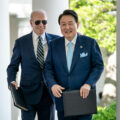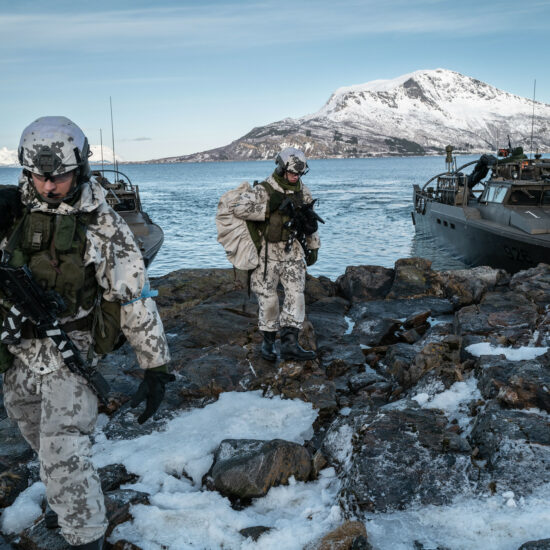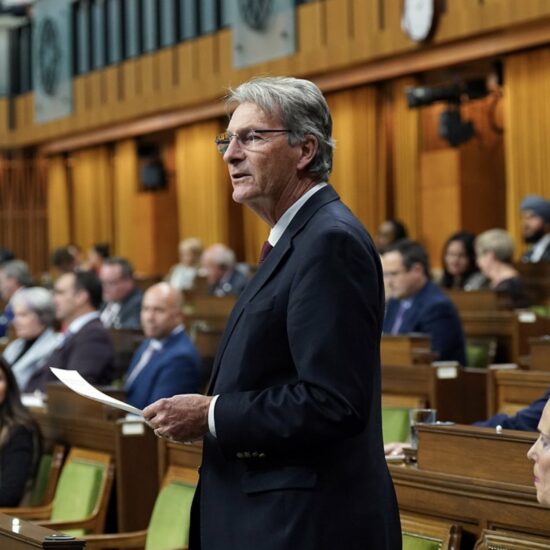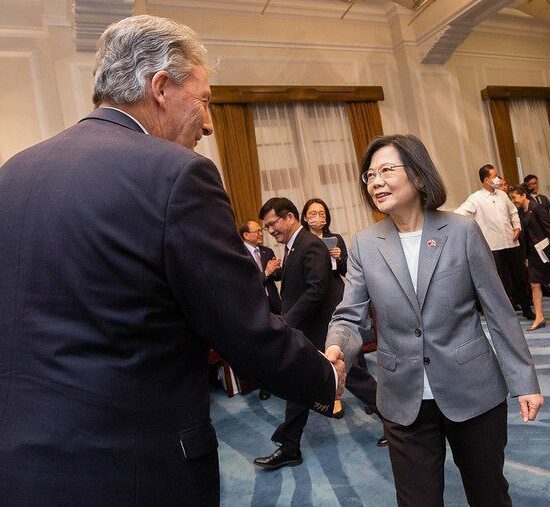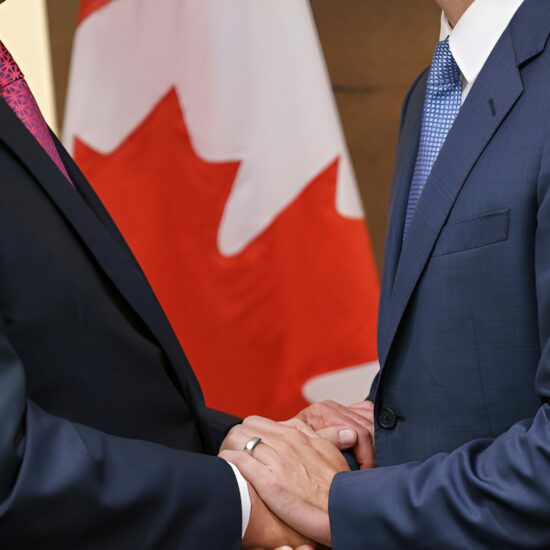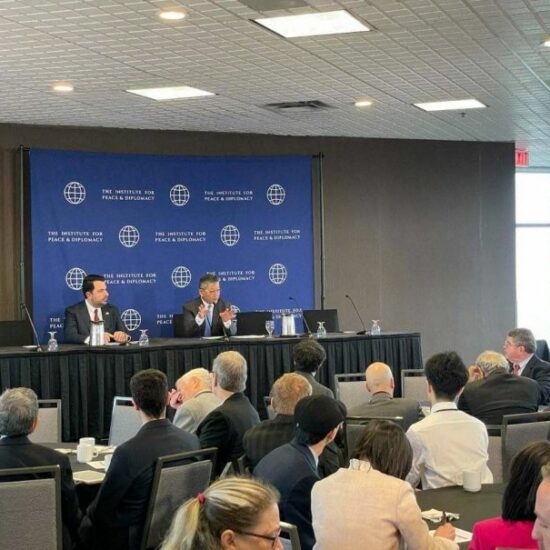
Image Credit: Office of the Prime Minister
This paper is published as part of IPD’s China Strategy Project.
It is widely acknowledged that the rules-based international order is in crisis. Russian revanchism has destroyed Europe’s collective security architecture, while persistent North-South disputes threaten the smooth functioning of global multilateralism. But it is China’s steady rise that presents the more long-term and formidable challenge to the status quo, even if Beijing has benefited to a significant extent from the existing order.
Often characterized as a “middle power”, Canada is said to retain a major stake in the survival of the rules-based order. Encouraging China to adhere to existing international norms – whether through engagement, coercion, or a combination of both – is therefore thought to be a core foreign policy imperative for Ottawa if it wishes to preserve the international conditions which have underpinned Canadian prosperity and security since World War II.
This paper takes issue with both aspects of this conventional narrative. First, it is not merely the rules-based international order that is in crisis. Rather, in addition to the flaws inherent to the concept of “rules-based order” itself, the more significant development is that any recognizable form of order appears implausible today. Second, although Canada may retain a stake in the survival of rules-based multilateralism for other reasons (such as its reliance on international trade), its preferred vision of international order does not flow from its supposed middle power status. This is because Canada is no longer a middle power.
Both of these facts should inform Canada’s approach toward relations with China, as well as the scope and goals of Canadian foreign policy more broadly. Specifically, in spite of recent tensions in the Canada-China relationship, Ottawa would be wise to adopt a posture rooted in caution and restraint, cooperating with Washington on the security implications of China’s rise where necessary while keeping the door open to engagement with Beijing where possible.
Rules-Based Order?
The term “rules-based international order”, at the heart of Canada’s foreign policy since a 2017 speech to Parliament delivered by then-Foreign Affairs Minister Chrystia Freeland, comes with obvious appeal. Its imagery clearly draws a line in the sand between previous historical eras and the present day. Unlike the 19th and 20th centuries which were based on spheres of influence and “might makes right”, so the argument goes, the post-World War II era has gradually sought to enmesh states into a form of interaction rooted in multilateral institutions and rules-based cooperation.
However, the term “rules-based order” suffers from three key deficiencies.
The first – and simplest – is definitional: Whether the word “rules” is interpreted loosely or strictly, the concept of “rules-based order” becomes problematic. The looser definition is undermined by the fact that all orders are, to some extent, based on rules (whether formal or informal), if only to render state behaviour more predictable. The stricter understanding of rules – rooted in “thick” multilateral institutions and an extensive body of international law – may make the distinction clearer between the characteristics of the post-World War II system and those of previous eras. However, as Patrick Porter has illustrated, this makes the term “rules-based order” oxymoronic: Strict rules suggest the need for rigidity in their application, whereas the task of preserving order inevitably requires compromise.
The second, perhaps more complex issue concerns the perceived legitimacy of the rules themselves. Today’s changing global balance of power has been accompanied by great powers contesting the norms which should underpin the international order. As such, while it may be in vogue for Western leaders to insist that China must respect the established rules, this entirely misses the point. Norms are political by their very nature, as they are the product of struggles to shape their content and meaning. The question not only of what rules, but also of whose rules, should apply is impossible to avoid.
Seen from this perspective, the term “rules-based international order” is viewed in Beijing not as a neutral term or objective description of the status quo, but rather as a rhetorical device through which the West attempts to set the terms of international engagement at China’s expense. Simply put, hectoring China over the need for it to respect the “rules-based international order” is going to get Western countries nowhere. With US President Joe Biden openly declaring that his country is in a contest with China to “win the 21st century”, statements insisting that Washington has no qualms with Beijing’s growing power and only wants it to “adhere to international rules” will ring hollow.
The First Global Order
The third issue is perhaps the most profound: Not only does the rules-based order appear existentially threatened, but it is becoming increasingly impossible to imagine an order of any kind capable of responding to the challenges of today.
Throughout modern history, other forms of order have existed besides the “rules-based” variety visible over recent decades. Hegemony, spheres of influence, and great power concerts have all served to provide order of one sort or another. Yet none of them appears fully capable of structuring interstate relations today.
Today’s return of great power rivalry is owed precisely to the failure of the United States to exercise a singular hegemony over all other powers. The contemporary international order of global scope is simply too culturally diverse – and its distribution of power too diffuse – for a single state to dominate, even if Washington remains far ahead of its peer competitors in economic, military and technological terms. This is something that Henry Kissinger recognized as early as 1994 in his seminal tome Diplomacy. Richard Ned Lebow further notes that, due to the postwar growth of Europe and Japan, alternative centres of power have existed for decades which have prevented the international order from being fully “unipolar”. Simply put, the United States (or even the wider West) will not be able to entrench a uniform “liberal international order”, rooted in a single set of political values, in which it is the only term-setting power.
Post-Cold War efforts to construct a liberal international order of global scope are also the reason why a great power concert cannot provide an alternative source of order today. In the 19th century, the European great powers famously agreed to uphold a balance of power amongst themselves, known as the Concert of Europe or Congress System. By contrast, not only is there no equilibrium to uphold today given the scale of US pre-eminence, there is also no agreement between the great powers on the principles which should structure interstate relations.
This disagreement has played out most recently in the diplomatic crisis over Ukraine, in which the Western insistence on Kyiv’s “right to choose” its geopolitical orientation clashed with Russia’s pretensions to special great power privileges, tragically culminating in war. Washington’s vision of a “liberal international order”, in which other great powers agree to transform their economic and political systems and accept their place in a US-led international system, is manifestly incompatible with the polycentric conceptions of international order prevalent in Moscow and Beijing. So long as these fundamentally different visions of order coexist, cooperation between great powers will remain selective at best.
If a great power concert is no longer realistic, then one might expect spheres of influence to emerge and provide a modicum of order (even if unjustly), much like during the Cold War. However, states are no longer easily subsumed into a great power’s sphere of influence. In Asia, for instance, many leading states do not wish to choose definitively between Washington and Beijing, preferring to maximize the benefits of US security guarantees and economic relations with China simultaneously. Indeed, the United States has even had difficulty bringing so-called “rogue states” such as Venezuela, Iran and North Korea to heel.
Several features of the contemporary international order leave smaller countries well equipped to resist great power pressures: an integrated global economy allows countries to transcend some of the limitations imposed by geography and reduces the incentives of territorial conquest, a quasi-multipolar balance of power gives states the ability to play great powers off against one another, and restrictions on the use of force have altered perceptions of legitimate state behaviour. While great power competition can generate a tremendous amount of disorder and make multilateral cooperation more difficult, the great powers alone can no longer impose their will on the entirety of the international system.
What appears to be emerging today, albeit in a rather disorderly fashion, is the world’s first truly global international order. The 19th century featured an imperial core and a colonial periphery, the Cold War divided the world into two separate spheres of influence, and the post-Cold War project of building a “liberal international order” was a largely Western prescriptive effort to set the terms of international political life for other states. Only now do we finally appear to be witnessing the formation of something approaching a universal order of sovereign and equal states. It is therefore unsurprising that the ordering mechanisms of previous centuries – including liberal theories of rules-based cooperation – are struggling to provide order today.
Middle Power No More
The term used most often to describe Canada’s place on the world stage is that of a “middle power”. Middle power status is cited as one of the principal reasons why Ottawa has played such a significant role in multilateralism since World War II: Unlike the great powers whose competition for influence can often be more unilateral and zero-sum, middle powers not only benefit from the stability provided by rules-based cooperation but also hold enough weight to act as important players in the multilateral system.
Canada may have good reasons for investing in certain forms of rules-based cooperation between states, but middle power status is no longer among them. For one, as outlined above, the rules-based order to which Canada has historically contributed is in crisis precisely because of the competition over who gets to write the rules. The assertion, historically popular with liberal internationalists, that the problems caused by the successes of rules-based cooperation (e.g., China’s rise) can simply be resolved by more rules-based cooperation is blind to this fact.
While multilateralism may be in crisis, Canada’s middle power status has largely been eviscerated. Part of this is due to the actions of Canadian governments which have led to Canada’s increasing marginalization from world affairs. This story is already well known, featuring years of chronic underinvestment in the foreign service, the military and foreign aid, together with an unwillingness to devote the necessary energy and political capital to rethinking Canadian foreign policy at a time of international change. However, Canada’s decline from middle power to, quite simply, not a power is also owed to the changing structure of the international order itself – a process which lies beyond Ottawa’s control.
The story of 19th-century geopolitics largely centres on the great powers. The Cold War, by contrast, produced a clearer picture of middle power status: Not one of the two superpowers, nor part of the Third World, Canada along with other leading allies of the capitalist bloc could be thought of as middle powers. Yet the end of the Cold War muddied these waters. For one, the economic rise of much of the Global South resulted in Canada’s relative influence declining by default. But perhaps more importantly, the collapse of the US-backed “liberal international order” project has changed the definition of what constitutes a middle power.
Although we are witnessing the emergence of the first truly global order, great power rivalry has helped ensure that this order will be fragmented rather than uniform. Certain global issues (e.g., climate change) will persist, but disagreements over which rules, which standards and which powers should dominate the Euro-Atlantic and Asia-Pacific theatres has led to the rising importance of regions by default. Nor is regionalism the only cleavage to account for: Sub-orders within the overall global order may also emerge along functional or ideological lines. In this new context, status within the global multilateral system is no longer the primary indicator of what constitutes a middle power.
In a white paper published earlier this year by the Institute for Peace & Diplomacy, middle powers were defined in the emerging, increasingly regionalized international order according to four criteria: enduring regional presence and geographic rootedness, considerable economic and military capacity relative to neighbours, historical and cultural pedigree as civilizational states, and the regionally focused and limited extent of their ambitions. Canada plainly does not meet these criteria.
Even if it were to hold a level of economic and military strength equivalent to that of middle powers from other regions, Canada’s relative power in North America leaves it without a region in which to exercise its influence. This distinguishes Canada from Australia, the latter of which more clearly fits the bill of an Asia-Pacific regional middle power. Canada’s ability to play the role of Euro-Atlantic middle power has also been curtailed due to Europe’s gradual economic and political integration. And rather than regionally focused goals, Canadian foreign policy has often featured its extra-regional (e.g., transatlantic) and global (e.g., multilateral and values-based) dimensions most prominently, attested to by phrases such as “the world needs more Canada” or assertions that Ottawa uses multilateral fora to help it “punch above its weight”.
The West’s rhetorical response to Russia’s invasion of Ukraine, declaring a new age of “democracies vs. autocracies”, may seem reassuring to those who wish to reassert Canada’s middle power status. But with roughly half the world’s population opting to remain neutral, the spheres of influence of the Cold War era will not be so easily reconstructed. Others might see in “niche diplomacy” an opportunity to rediscover Ottawa’s traditional role, but an international order in rapid transition renders such niches difficult to identify. With the great powers unlikely to agree to new rules of the game until the outcome of the current contest is determined, Canada is left with the task of ensuring that its fall from middle power stops short of satellite status.
Conclusions
This paper has argued that Canada’s approach toward China should not primarily be based upon pushing Beijing to adhere to the “rules-based international order”. This is due to problems concerning the conceptual and practical viability of “rules-based order”, as well as the erosion of Canada’s middle power status which has traditionally buttressed its position as an influential player in the multilateral system. This is not to say that mutually acceptable rules of the game between China and Western countries will not need to be found. Rather, the problem lies in the implicit assumption that, in insisting that Beijing adhere to the existing “rules-based international order”, China is expected to remain a rule-taker rather than an equal rule-maker even as its relative power increases. This is evidently something that Beijing will never accept.
What can be asserted with relative certainty, however, is that some sort of power transition is underway between Washington and Beijing, the timescale and outcome of which remain unclear. China threatens not necessarily to replace the US as a global hegemon, but rather to erode Washington’s relative power – if not globally then at least in East Asia. Canada has lived through hegemonic power transitions before, having shifted superpower patrons from Britain to America. Today, rather than clinging to the old order, the circumstances call for a Canadian approach rooted in caution and restraint. The uncertain outcome of the current Sino-American competition does not imply that Ottawa should adopt a posture of hedging between Washington and Beijing, but rather that it cooperates with the former on the security implications of China’s rise where necessary while keeping the door open to engagement with the latter where possible.
A related question concerns what Canada’s relative decline should imply for its wider foreign policy. Simply put, although the challenges facing multilateralism may offer Canada the opportunity to contribute to certain technical fixes such as on trade and climate change, the conditions for Ottawa to play the same international role that it did over previous decades largely no longer exist. In fact, the political risks that any Canadian government would face in launching another bid for a UN Security Council seat after two consecutive defeats aside, Canada’s path to winning such a seat may now be exceedingly narrow in a world of regional blocs, irrespective of Ottawa’s reduced international profile.
Canada effectively faces two choices: (1) undertake a sustained and concerted effort to reverse its international marginalization or (2) adjust its core foreign policy aims and public discourse to the new reality. Both options are strategically coherent and would embody an attempt to set the terms of Canada’s international existence – getting more serious about foreign policy does not necessarily need to imply increasing the size of Canada’s international footprint. But this is a choice which should be articulated explicitly, avoiding jargonistic and vague expressions – such as Canada’s supposed “role in the world”, “who we are”, or the need for Canadian “leadership” – in which both rising and established powers across the globe have little interest.
Continuing with the status quo approach, in which Ottawa pretends to remain a middle power and multilateral powerhouse despite being a secondary or even tertiary player on issues shaping the future of global order, would represent the worst of both worlds, offering Canada none of the benefits of a more targeted foreign policy. And while the latter option may be the most realistic of the two under the current circumstances, it will not be without its costs. Foreign policy has long served the purpose of furthering Canada’s perceived distinctiveness from its southern neighbour. A departure from the image of Canada as a leading middle power would mark a change not only for the country’s foreign policy but also for the identity-based discourse that it employs to foster a shared sense of national unity. A strategy for addressing the China challenge can be effective only if it is nested within a broader understanding of the purpose of Canadian foreign policy. Rather than asking how Canada can save the rules-based international order from the threats facing it, which is an inherently reactive exercise, a more urgent and fundamental task is to identify – and, if necessary, reconceive – the scope of Canada’s national interests in a changed (and still changing) world.
Dr. Zachary Paikin (@zpaikin) is a Nonresident Research Fellow at the Institute for Peace & Diplomacy where he directs the Institute’s China Strategy Project, as well as a researcher at the Centre for European Policy Studies in Brussels. He is also a Senior Visiting Fellow at the Global Policy Institute in London, UK.

